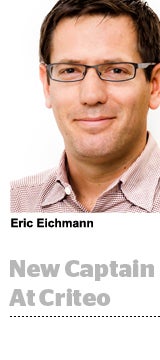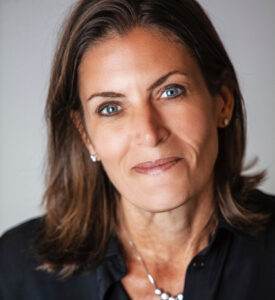 French performance marketing giant Criteo’s promotion of its president and COO Eric Eichmann to CEO, effective Jan. 1, recalls Rocket Fuel’s recent leadership change.
French performance marketing giant Criteo’s promotion of its president and COO Eric Eichmann to CEO, effective Jan. 1, recalls Rocket Fuel’s recent leadership change.
Eichmann succeeds JB Rudelle, Criteo’s founder and longtime chief, who will move into an executive chairman role.
So why is this happening? Generally speaking, Criteo is worth more than every ad tech company that went public in the last two years combined.
“Criteo just did $1 billion in topline revenue, and if you and I sat down and racked our brains, I don’t think we could come up with 10 companies who do that much topline, based on a CPC model,” said one source with knowledge of the company. “That’s nothing short of a digital marketing miracle.”
Eichmann’s promotion is significant, though Brian Wieser of Pivotal Research said it’s “pretty common” for entrepreneurs to step aside once their companies reach a certain scale and maturity.
Andrew McNellis, director of equity research at Evercore, agreed: “Eric has been a key member of the management team and often the public face of Criteo for some time, so I don’t think his appointment really surprised anyone.”
Others in the investment community suggest Criteo’s CEO shift could precede a transformation of its business strategy, particularly as other public ad tech contemporaries like Rocket Fuel eye the more predictable recurring revenue model.
Criteo wants to differentiate around an “always on” platform model – as opposed to inconsistent I/O-based revenue, sources say.
More ad tech companies are attempting to move from managed media to programmatic self-serve models, particularly as clients demand more control and transparency into their campaigns.
Shoe and apparel brand client Steve Madden, for instance, said it wanted more insight from Criteo into cross-channel conversion, not just dialogue on media volume with little to no visibility under the hood.
While retargeting drives results, “Every ad tech company has and will continue to be punished for a lack of quality revenue,” said Elgin Thompson, managing director of Digital Capital Advisors, particularly as brands and publishers face growing issues like ad blocking.
“Investors, both public and private, place higher value on recurring revenue and avoid impression-based and performance media plays,” he added. “Therefore, [ad tech companies like] Criteo [are] searching for a formula to generate SaaS revenue. A leadership change buys them time with investors to put in place a strategy and execute on it.”
Eichmann’s appointment could also be interpreted as a signal that there is a “deep bench” at Criteo, added Thompson. This means the company is comfortable making a top-level change, despite Rudelle’s “miraculous” feat of keeping Criteo stock well above its IPO price.
Separately, Criteo has been investing heavily in diversifying its products so it can better drive value for advertisers – including its algorithmic engine for display ad retargeting and its forays into creative optimization, email, mobile, cross device and native solutions.
It is also investing in data-driven tools meant to harness CRM and perform audience targeting. Criteo’s experimentation with more user-level data for Facebook Dynamic Product Ads also portends growing interest in capabilities around measurement and attribution.
“Clients are looking for better ROI, and all publishers are looking for better CPMs,” Rudelle told AdExchanger in an earlier interview. “We’re moving into a world where clients will pick one partner to optimize their buys on all inventory.”














